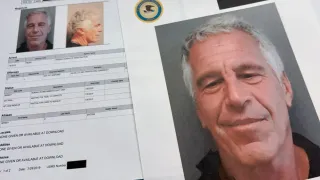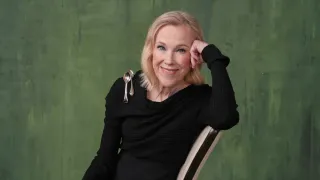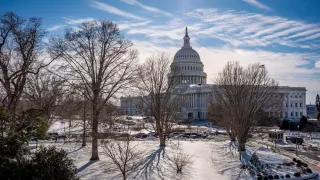January 29, 2017
Women's March Sends Message to Trump
Sari Staver READ TIME: 5 MIN.
From the opening remarks at the rally before the San Francisco Women's March to the rain-soaked finish down Market Street, the queer thumbprint was on the stage, in the crowd, and behind the scenes.
Beginning weeks ago, when the National Center for Lesbian Rights decided to organize an LGBT contingent, the queer community has played a crucial role in organizing, running, and participating in the five-hour event January 21 that drew over 100,000 people, according to CBS 5, and was part of an international movement for human rights, civil liberties, and social justice.
Other Bay Area cities that had marches included Oakland, which drew more than 80,000 people, and San Jose.
The first speaker at the Civic Center rally, Ruth McFarlane, director of development at NCLR, told the crowd that the march was "the moment we were born for."
"It is not what we were expecting and it is not what we wanted. But which woman who stood up and spoke out ever got exactly the moment she wanted or expected?" asked McFarlane, who identifies as a black lesbian.
Noting that she was on stage representing the LGBT community as well as NCLR, McFarlane discussed the importance of forming "broad coalitions."
From the time NCLR was formed in 1977 the group realized that its work "cannot get done by us alone," she said.
After seeing the Trump administration immediately remove policies related to LGBT protections, HIV/AIDS, and climate change from the White House website, the formation of coalitions "is the only way we will be able to move forward," McFarlane added.
"Women's rights are human rights. We rise up in support of a vision that while it demands justice for all, is particularly mindful of those who are least likely to be heard, first to be attacked or cut off or punished unfairly," she said.
"In our lifetimes, there has never been a more profound challenge to this country's ideals of justice, inclusion and equality than there is today," she added.
Transgender activist Julia Serano, also addressing the pre-march rally, said she was speaking because she had "learned so much from other marginalized people from diverse backgrounds and perspectives."
"Our ability and willingness to empathize with one another, and to work together as a coalition? - ?where your cause is my cause, and my cause is your cause? - ?that is how we are going to resoundingly defeat Trumpism," she said.
In an email to the Bay Area Reporter on Monday, Serano wrote, "Since the election in November, many of us have been in shock over the results, and consumed with feelings of hopelessness and fear of what's to come. I think the Women's March reminded many of us that we do represent a majority of this country. And while Trump may now be president, Trumpism is not very popular in America. The sheer numbers of the protests around the country and around the world prove that. It's my hope the march is a spark that mobilizes us to actively fight back against this administration's unpopular and backwards-thinking policies."
She added that what she found most heartening about the march was the fact that organizers, speakers, and the crowd "seemed to all recognize that this needs to be an intersectional movement that includes a broad coalition of not only women, but all minorities and all people who have been pushed to the margins of society."
A number of LGBT organizations registered their contingents, according to march organizers, including the Alice B. Toklas LGBT Democratic Club, Dyke March, Trikone, and the Asian Pacific Islander Queer Women and Transgender Community.
Speaking for the Alice club, Co-Chair Lou Fischer told the B.A.R. in an email that some 50 club members and allies marched "to show Trump and the rest of the world that we will not sit by complacently and let this president and the Republican majority in the House and Senate take away health care, reproductive rights, immigration, LGBT/civil rights and all the other social benefits that we have gained."
Fischer said that the club has formed a committee to encourage club members to participate in political actions to protect the rights of LGBT people, and work in coalition with other clubs and interest groups who may lose rights in the Trump administration. (See the online Political Notes column for more.)
Gay men were a visible part of Saturday's march, including a number of city officials.
California state Senator Scott Wiener (D-San Francisco), interviewed on his way down to the Civic Center, said he was marching because "we have a president who doesn't respect women" and who has "opposed health access for women ... and bragged about sexually assaulting women."
Wiener, a gay man who previously was a city supervisor representing District 8, which includes the Castro, said that the president, as well as Congress "has vowed to tear apart immigrant families" and "has attacked LGBT people."
"Women are under assault and we've got to stick up for them," he said.
Current District 8 Supervisor Jeff Sheehy, a gay man who was recently appointed by Mayor Ed Lee to replace Wiener, said in an email that he marched with families whose children attended the Clarendon Elementary School with his daughter, Michelle.
"Our daughters were the drivers and instigators," said Sheehy, a longtime AIDS activist. "They want to stand up to Trump, do something to fight back. A couple of girls stayed up late Friday making signs, which they carried the whole route. Standing for two hours at a rally listening to the speakers, marching in the rain, soaked, exhausted, and hungry, the girls started leading chants around New Montgomery instead of repeating chants.
"Chanting 'Love Trumps Hate,' those girls got a second wind," Sheehy added. "Fierce, resolute faces filled with love, hope, and resistance. I am so very proud of my daughter, her friends, and everyone around the world who marched in solidarity."
Asked about his plans going forward, Sheehy said, "I support Mayor Lee's leadership in asserting San Francisco's status as a sanctuary and join in resisting threats and actions from the administration targeting our immigrant sisters and brothers."
He added that he's particularly focused on sustaining the health care safety net that has been developed in San Francisco.
"We should all keep gathering and marching too - we need to sustain our solidarity achieved by coming together as a community to show our defiance."
Gay City College of San Francisco Trustee Tom Temprano said in an email that he marched because "Trump needs to know that if he tries to roll back LGBT rights, attack our immigrant neighbors, take away women's health care, or privatize public education that the American people will stand in his way."
"We sent that message loud and clear on Day 1," he added.
Some of the people attending the San Francisco march traveled several hours.
Dr. Elizabeth Harrison, a Rocklin, California psychiatrist and longtime women's rights activist, said, "Planned Parenthood, for over 50 years, has been where the teenage girls and young women have gone for birth control, infections, disease prevention, mammograms, and Pap smears."
"The younger girls are not going to go to the county clinics or their family doctors," added Harrison, a lesbian.
She added that women of all ages access Planned Parenthood for potentially life-saving screenings.
"I remember when in Orange County, before abortion was legalized, complications of illegal abortion were the number one cause of death of women of child-bearing age," Harrison said. "We can't go back."
Dr. Patricia Robertson, an obstetrician, was also at the march.
"The stakes are too high to be a bystander," said Robertson, a lesbian. "At 67, as a physician, I continue to march for health care equity, for women's reproductive rights, and for justice for all."
After the marches, organizers, still buoyed by turnout across the country, offered ways people can take action during the first 100 days of the Trump administration. Fore more information, visit https://www.womensmarch.com/100/.






